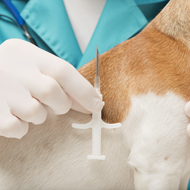Dog microchip law comes into force

Defra figures suggest that more than one million of the UK's dogs have still not been microchipped and that a significantly larger number of contact details are not correct on microchip records.
New rules coming into force today (6 April) make the microchipping of dogs a legal requirement in England, Scotland and Wales.
Under the new law, all dogs must be chipped and registered on one of the authorised databases by the time they are eight weeks old. Owners must also keep the contact details up to date if they move house or change their phone number.
From today, if the authorities find an un-microchipped dog its keeper may be served with a notice requiring them to comply with the law. Those who fail to adhere to this notice will face fines of up to £500.
The aim of the legislation is to reduce the large number of dogs that are lost each year by reuniting them with their owners more quickly. It is also hoped that microchipping will make it easier to trace irresponsible keepers - including puppy farmers and those guilty of animal cruelty.
Defra figures suggest that more than one million of the UK's dogs have still not been microchipped and that a significantly larger number of contact details are not correct on microchip records.
According to research by the Dogs Trust last year, nearly 50 per cent of dog owners surveyed did not update their details when they moved house.
Also in the news this week is a new Veterinary Microchip Data service, which aims to help address the problem of incorrect contact details using a synchronised system that coordinates modern practice management systems with the National Veterinary Database (NVD®).
This allows for ongoing, automatic renewal of client contact details via their veterinary practice, so clients need only inform their practice of a change of contact details.
Some changes to microchipping rules already came into force last year. As of 24 February 2015, no person may implant a microchip in a dog unless they are a veterinary surgeon or veterinary nurse acting under the direction of a veterinary surgeon, or a vet student or vet nursing student acting under the direction of a vet.
An approved training course must also have been successfully completed and training received on implantation (including practical experience).
Since April last year, vets and nurses in England have also been legally required to report cases where a dog's microchip has been removed, malfunctioned or migrated.



 The RCVS has announced a new version of its 1CPD mobile app, with enhanced features for veterinary surgeons and veterinary nurses to record their continuing professional development.
The RCVS has announced a new version of its 1CPD mobile app, with enhanced features for veterinary surgeons and veterinary nurses to record their continuing professional development.